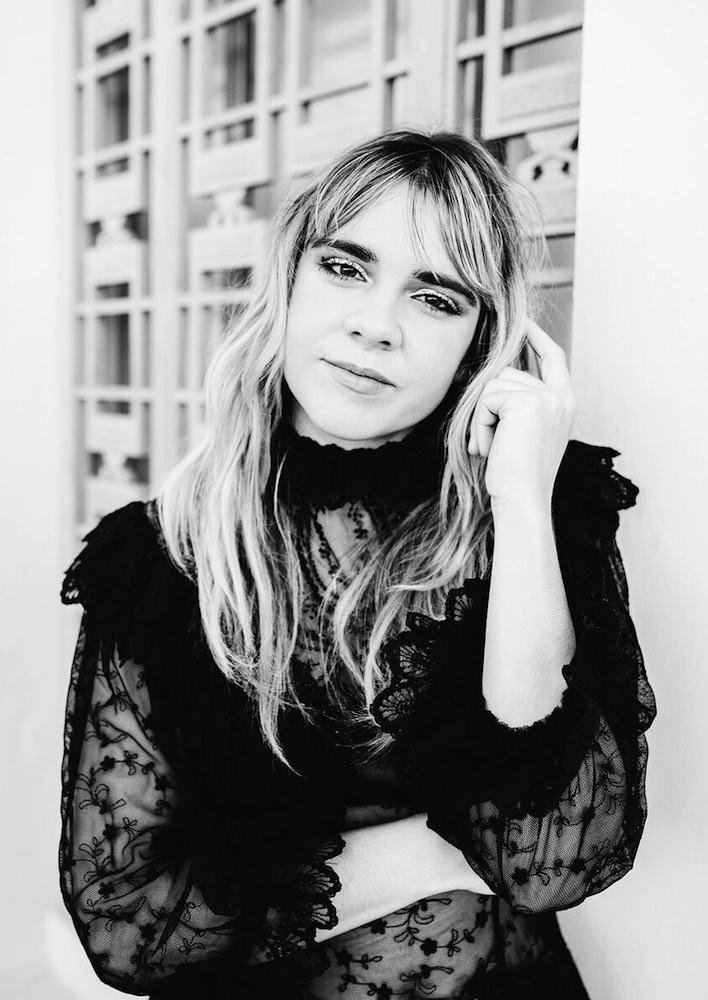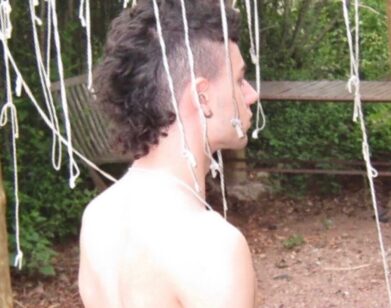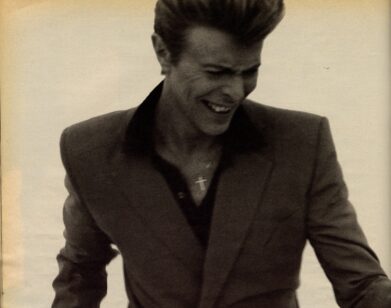Gothic Tropic
CECILIA DELLA PERUTI IN LOS ANGELES, JULY 2016. PHOTOS: CARA ROBBINS. STYLING: LISA MADONNA. HAIR: ERICKA VERRETT. MAKEUP: KAROLINA BERNAT.
While Los-Angeles based trio Gothic Tropic technically fall under the indie pop umbrella, their true genre is encapsulated in their name. With roomy, entrancing vocals and guitar guiding the way, they take inspiration from classic rock (frontwoman Cecilia Della Peruti’s formative first album was Fragile by Yes), Bauhaus, and West African music. The result is a compelling collection of contrasts, both musically and lyrically, which, for the first time, will be put on full display via the band’s forthcoming debut LP, Fast or Feast (Old Flame Records).
While the album won’t arrive until October 28, here, we’re pleased to premiere “How Life Works,” its second track. It’s a song about losing oneself in someone else, and a step into the chasm the band is able to bridge with their songs. It’s at once powerful and celebratory, exposed and acquiescent, sonically effervescent and synthetic, and all the while earth-bound.
27-year-old Della Peruti was born in New Jersey, but has lived in L.A. since she was 12 (save some back-and-forth due to a custody battle, which she with a laugh calls “flattering”). She’s been gigging as a professional musician for six years, ever since forming Gothic Tropic and releasing Awesome Problems, their first EP, in 2011. Now, after years of touring with the likes of Børns, Charlie XCX, and Night Terrors of 1927, Della Peruti—along with her bassist Brad Bowers and drummer Rhys Hastings (who tracked and co-wrote on the album, respectively)—will perform own band’s music. Tomorrow evening, you can find the group at the Satellite in Los Angeles, playing “How Life Works” in celebration of the single’s release.
HALEY WEISS: Did “How Life Works” emerge from like a particular experience?
CECILIA DELLA PERUTI: Kind of—it’s a relationship tune. I wrote it a long time ago and just recently reproduced it and rearranged it, so I kept some of the things that might’ve moved me to write it in the first place. Basically, in the relationship that I was in [when I wrote it], I realized I was burdened by subtle demands, by things like prerequisites that make me attractive to this person. There were unrealistic expectations that I didn’t realize were taking a toll on me. All of the verses are apologetic, saying sorry for some basics that maybe I shouldn’t be saying sorry for. The chorus is more sincere, “I want to be good for you,” which is pretty romantic and actually how I felt. It’s not sarcastic. It was me noticing [myself] morphing into whatever he wanted me to be. In the bridge it opens up and I realize that, and the lyrics are, “If you let me be / You’ll count your lucky stars I’m free / I will be the renegade / The one who always makes your day.” It’s allowing my light to shine brightest when I’m free to be myself.
I added this whole bridge to it that didn’t exist before. Some of the melody in the chorus was different. There are some videos if you dig back years ago of us workshopping the song live. Actually, [I worked on it while] I was on the road in Europe with Børns, sending ideas back and forth with the producer [Todd Dahlhoff].
WEISS: How did you end up on tour with Børns? Were you in the band?
DELLA PERUTI: I was in the band. I auditioned for stuff and do gigging as a way to keep income within the field of music. I was his keyboard player, I played guitar too. Usually the artists that have me play call me their “auxiliary.” So I’ll just do whatever they need—drum sampling, guitar, keys. I find myself mainly playing keys for people. It’s super fun, I’m learning constantly. It’s something that happened after doing a project and from then on people just kept recommending me so I’m kind of catching up with some basic, dire requirements now and things like that. But it’s cool how naturally it came about, and I just kept saying yes.
WEISS: Is it difficult to focus on your personal music while you’re doing that?
DELLA PERUTI: Yes, definitely. I try not to take the gigs but it’s been so serendipitous how the timings worked out. If there was a really serious conflict—it’s my rule—I’ll choose Gothic Tropic. Thankfully there hasn’t been any conflict. It’s crazy because my cycle is kind of off of their cycle because they’re huge pop projects and I’m more of a small indie pop band.
WEISS: When did you form Gothic Tropic?
DELLA PERUTI: It formed around the release of the first EP, [Awesome Problems,] which was in 2011. I was in another project that I was pretty committed to, so I didn’t actually expect this one to go for so long, or for people to be interested. I kind of realized that if there are people who are expecting me to do XYZ, maybe I should do that. It was a little challenging to make the switch from a purely cathartic, agnostic project that was like my heart and soul—just free-for-all no pressure—into, “Oh, let’s start working.”
WEISS: What made you make that change?
DELLA PERUTI: Because I would like for [the band] to be my work. I like to focus on it, so I’m happy to make my passion my job. Finding the balance to not lose the magic quality of having something that’s purely a hobby—there’s a way to like preserve that in any field.
WEISS: Have you been working Fast or Feast since the last EP, or is it just more recently?
DELLA PERUTI: I started recording it last year. Because we were patching it together while I was on the road, and the producer [Todd Dahlhoff] is also a touring musician, we just did it over the last year. If you actually tally up the amount of hours and days and squish it together, it didn’t take very long.
WEISS: Has Todd been involved since the EP?
DELLA PERUTI: No, I met Todd because he was playing bass in a band that I was playing for, Night Terrors of 1927, and then we just became friends and he said he wanted to make a record. I heard what he had done and I was like, “Yeah, let’s do it.”
WEISS: How long have you known that you wanted to be a musician? Did you start playing instruments when you were young?
DELLA PERUTI: Well, my parents are musicians; my mom [Juliana Gondek] is an opera singer, my dad [Carl Della Peruti] is a composer, a jazz guy. So they met—my mom was a soloist and the Metropolitan Opera, my dad was in the pit, playing trombone, and from then on it was just their lives.
WEISS: It sounds like a movie.
DELLA PERUTI: Yeah—Mozart in the Jungle. [both laugh] So they had me taking classical lessons on piano and violin when I was super young, like six years old. Then I went in the visual arts direction so I was pursuing fine art, but secretly, music was always my thing. I think I was just shy to unveil it since that was what my parents did, and they’re teachers and they’re judges—actual [music] judges—so I think that I didn’t want to step on their toes. I don’t know what kind of little child brain instinct that is.
WEISS: So when did you reveal to them that you were interested?
DELLA PERUTI: I revealed my own stuff when I was 18 or 19. It was accompanied by apologizing for maybe wasting some of their money on art school, because I said, “I love art, but I’m looking around and I’m not drawing obsessively like everybody else is. I’m listening to music.” They said, “Of course—do whatever. This is great.” Once, my mom was crying, saying, “This is so beautiful.” I was like, “Okay, okay, I’ll do it.”
WEISS: What has their reaction been to the music you’ve made under the name Gothic Topic?
DELLA PERUTI: They’ve seen the early days, so they know how much it’s grown since 2011, when we were just jamming really. They’ve said that they’re impressed with how this album focuses in—it sounds more mature—so they love it.
WEISS: Before you made a final selection of songs for the album, do you play things for them?
DELLA PERUTI: I do. Actually, my dad tracked trombone on [“Chemical Trail,”] one of the songs. I’m trying to see where my mom can fit in. Opera is tough; maybe we’ll make a concept record and do some sort of punk opera.
WEISS: Did you finish art school for drawing?
DELLA PERUTI: No—well, it was an apprenticeship that I finished, but I didn’t go on to do great things. [laughs]
WEISS: Do you think that drawing has informed your music at all?
DELLA PERUTI: The techniques and the brain space you go in when you work has definitely carried on. One of the first sessions I had, I had to create something really awesome and special, and then [the artist] told me to rip it up and throw it away. That definitely taught me not to be so precious with things. If you’re a creative, you just can’t put too much emotional investment in your work because it can lead you to never putting shit out. It’s kind of a dark hole you don’t want to go down. It’s the same with writing, I’m sure.
WEISS: How did you come up with Fast or Feast, the title of the album?
DELLA PERUTI: There’s always a duality lurking above anything I do. I feel like some of the songs are very generous and loving and some of them are angry and depressing. Also, some of the shit I’ve been through… Fast or Feast is when it’s good, it’s really good, and when it’s bad, it fucking sucks. That kind of sums up last year and this year.
WEISS: The first track on the album, “Stronger,” has a lyric where you talk about wanting to make waves and not play the PC game. Have you frequently felt that people want you to be PC and just do what’s expected of you?
DELLA PERUTI: Well, I’ve noticed it had been a standard I maybe put on myself, that I wanted to be very extremely easy to work with and agreeable. If there’s anything that should’ve been said, for the greater good, or should’ve been said for just requiring fair treatment, I didn’t really say it because I was avoiding conflict or judgment. Asking for very basic, decent treatment shouldn’t be included in the category of being difficult to work with. Those two things are not mutually exclusive.
WEISS: Do you feel like it’s a gender thing too?
DELLA PERUTI: There’s a bit of that because there are so many male producers and male songwriters—there are more women songwriters, actually—but I just felt like I wanted to say some things in a way that didn’t offend anybody. At the same time, if I did [say something], I could’ve just thrown myself into a debate I didn’t mean to have because, objectively, this other person is in the wrong and all I’m doing is not walking on eggshells. It’s just the very basic idea of saying no to fear guiding your decisions.
WEISS: What made you start taking Gothic Tropic more seriously as your personal project? You said that part of why you chose to pursue it is that you wanted music to be both your occupation and your hobby. Do you feel like that’s happened?
DELLA PERUTI: Yes—I feel like the effort is yielding results. It’s definitely working and it’s a slow climb. Like anything, moments can be discouraging, there’s rejection, and you have to just bet on it and keep going. But, yes, it is working. I’m really hard on myself and I put a lot of pressure on myself. I have to constantly remember that even if I wasn’t relying on this to work, I would still be doing it. So I strip away the pressure; I just have to remind myself to keep doing that because then you don’t want to go down the comparison K-hole, which is easy to do in L.A. So I just have to like remember that I’m by myself. I have a label and a lawyer and that’s it. [laughs] So I’m doing pretty well for having nothing else that all these other people have. You just have to keep driving your own ship. A lot of people don’t know that, so when they find out they’re like, “Oh, I had no idea you needed help.” Because I don’t want to ask for help either. So when people find out, like I’ve had angels just say, “Oh, you need this, here.” Everyone’s kind of an acting agent for each other—the community is, we’ve got that. That’s taking some of the weight off of each other’s shoulders; keeping your ear to the ground about what your neighbor needs and how you can help.
GOTHIC TROPIC WILL RELEASE FAST OR FEAST VIA OLD FLAME RECORDS ON MAY 19, 2017. TOMORROW, THEY WILL PERFORM AT THE SATELLITE IN LOS ANGELES. FOR MORE ON THE BAND, VISIT THEIR FACEBOOK.







